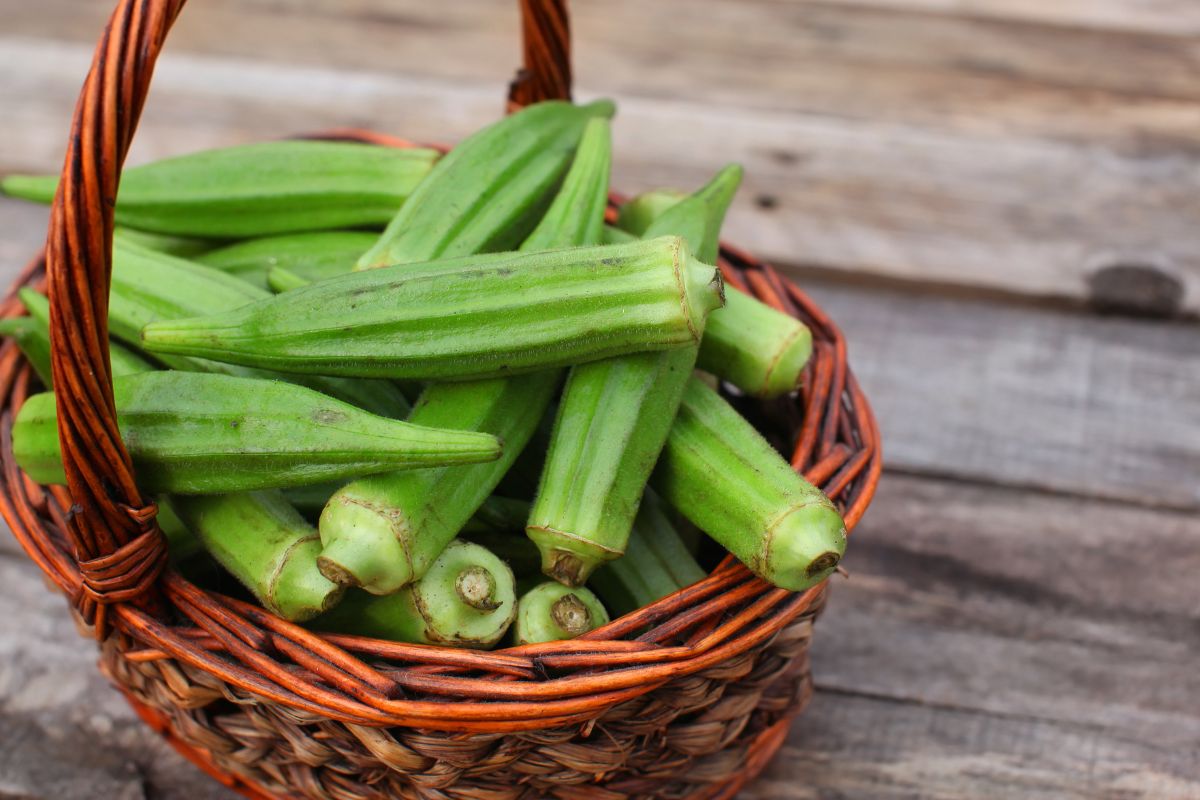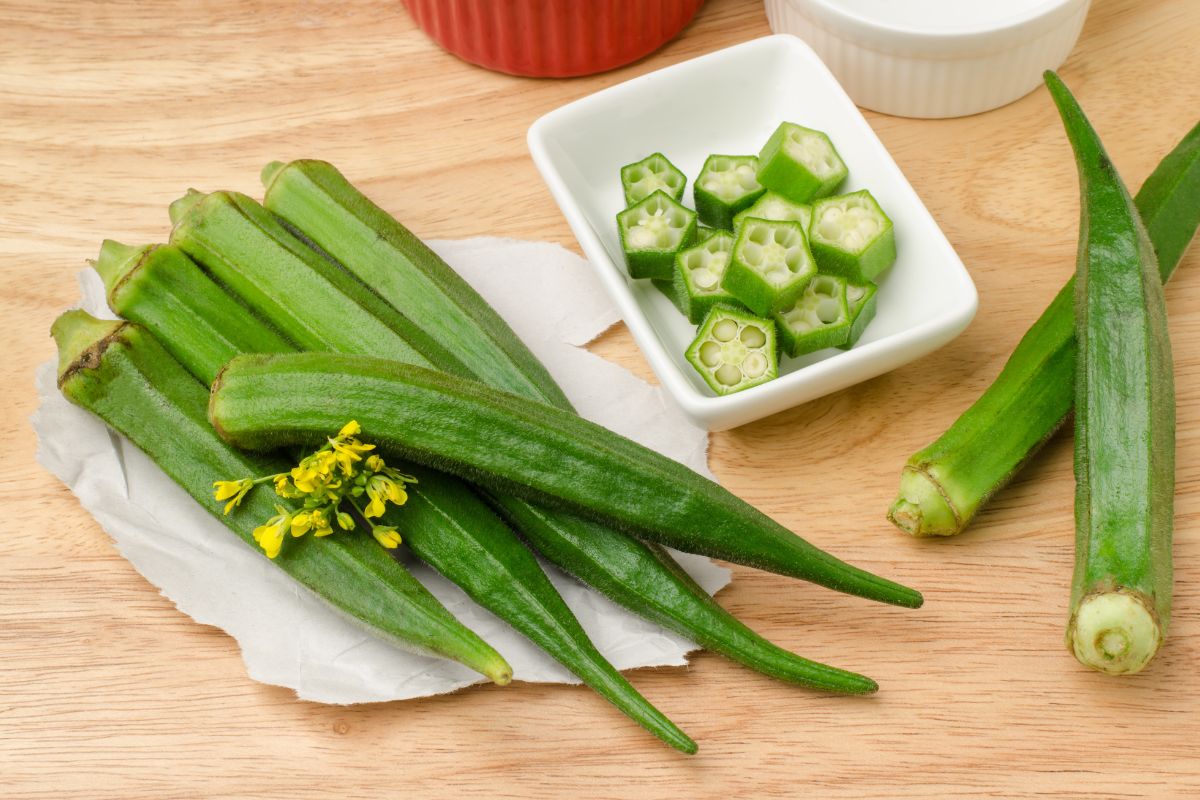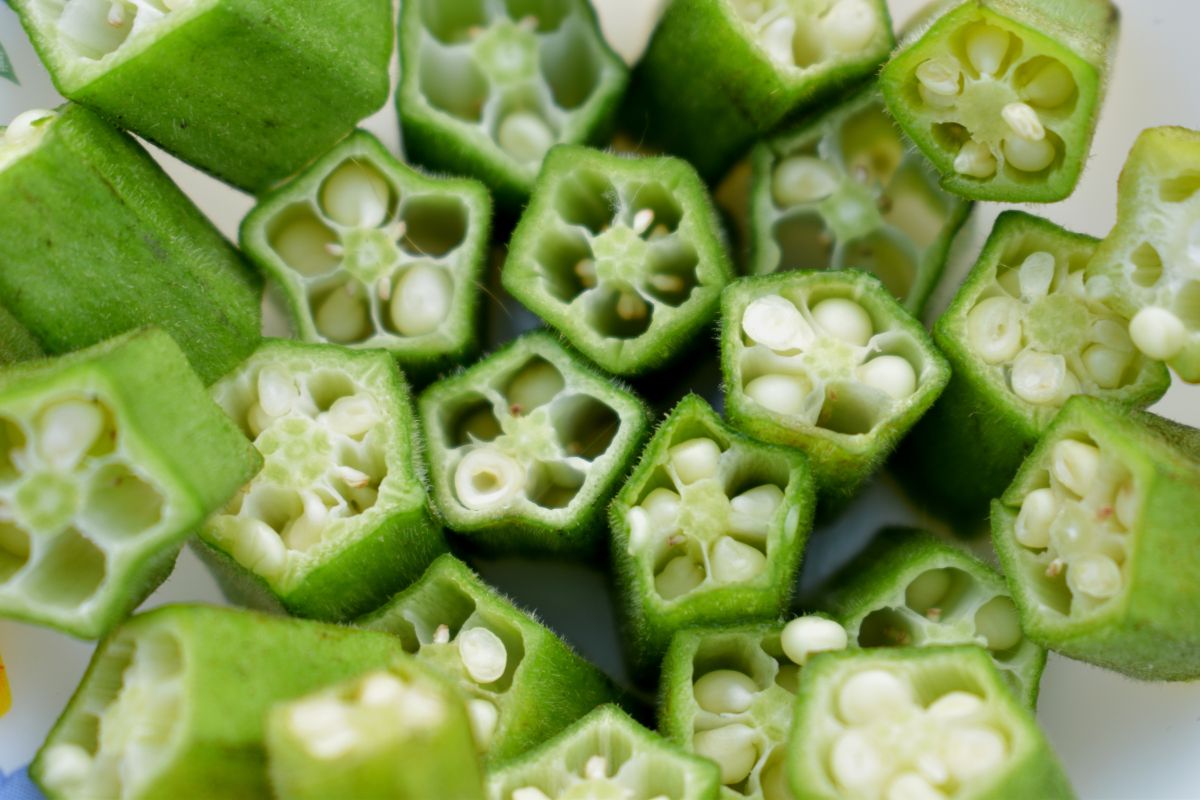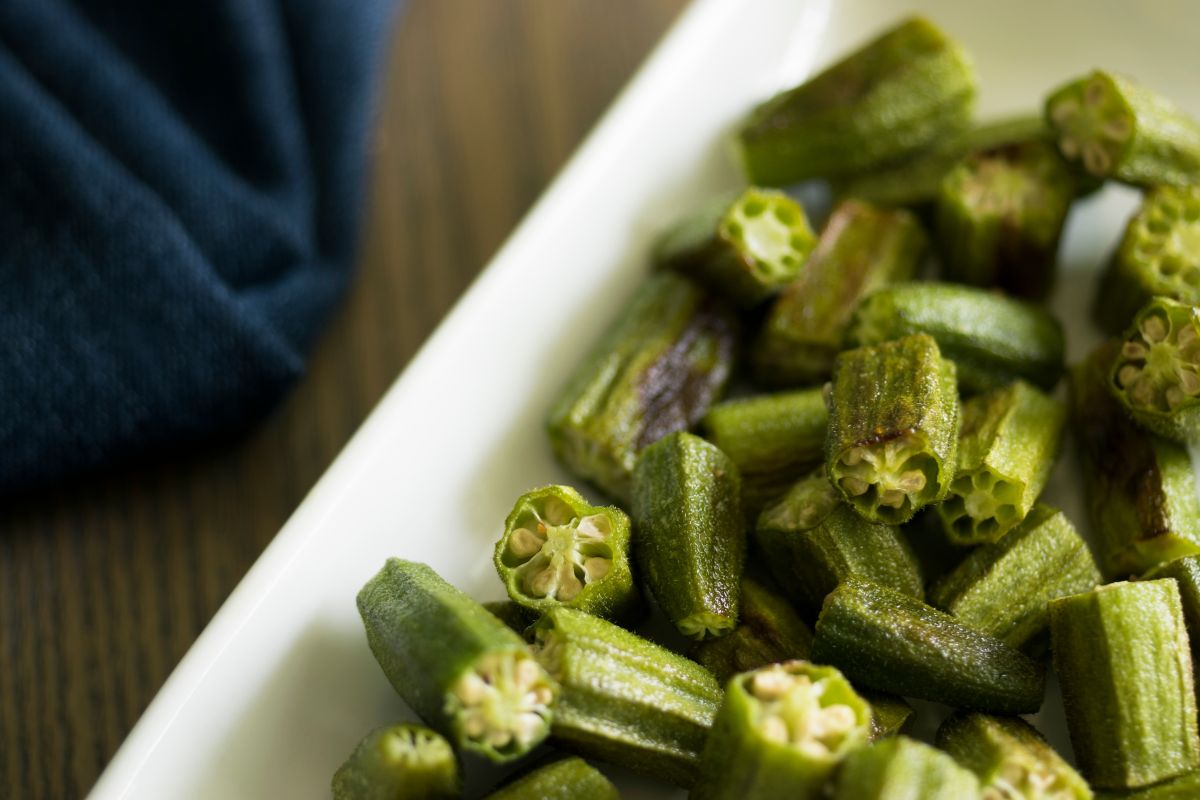You might have asked yourself: is okra a fruit or vegetable? You may have been puzzled by this question, especially when slicing those slimy green pods for a hearty gumbo. Let’s clear up the confusion once and for all.
In this article, we’ll dive into the botanical and culinary worlds of okra. You’ll learn why scientists classify it as a fruit and why chefs treat it as a vegetable. Plus, we’ll explore its surprising health benefits and tasty ways to add it to your diet.
Ready to discover the truth about okra? Keep reading to find out how this humble pod can be both a fruit and a vegetable and why it deserves a spot on your plate.
- Related article: How Are Vegetables Different From Fruits?
5 Key Takeaways on Is Okra a Fruit or Vegetable
- Okra is actually a fruit because it grows from the plant’s flower and has seeds. This is like green beans, bell peppers, and tomatoes.
- Even though okra is a fruit, people usually cook it like a vegetable. It’s a staple in South American and Southern U.S. dishes like gumbo and fried okra.
- Okra is low in calories but packed with nutrients. It has protein, fiber, vitamins (C, K1, A, B6), and minerals (calcium, magnesium, potassium). It also has antioxidants that protect the heart and brain.
- Eating okra can help manage blood sugar levels because of its polysaccharides. Research shows it has compounds that might fight cancer cells.
- Okra has some unique traits. Its slimy texture, called mucilage, aids digestion. It has a pentagonal shape and natural insect defenses. Plus, okra flowers attract pollinators, which help the plant reproduce.
Is Okra a Fruit or Vegetable?

Okra is a green pod shaped like a finger. Inside, it’s full of edible seed pods. People often call them “Lady fingers.” Okra plants produce okra pods.
The scientific name for okra is Abelmoschus esculentus. It belongs to the Mallow family. When you cut open these pods, they feel slimy. This texture thickens stews and soups well. Though used in savory dishes, many think of okra as a vegetable.
When you see an okra, do you think fruit or vegetable?
Okra Is a Fruit
Did you know okra is actually a fruit? Botanically, it develops from the flower of the plant and contains seeds. This is the same for foods we often call vegetables, like green beans, bell peppers, and tomatoes.
Okra blooms can be stunning with yellow and red colors or subtle purple and white. The fruit is pod-like to hold the seeds needed for reproduction.
The flowers have both male and female parts called gametes. There’s a pollen tube in the center and male gametes on the sides with the anther. These parts help with fertilization.
After fertilization, small cone-shaped fruit starts to grow. In less than a week, you can harvest the okra.
Okra Is a Vegetable
An okra is a vegetable in cooking. It’s popular in South American dishes and often found in gumbo. In the Southern United States, people love it as a fried side dish.
Chefs call okra a vegetable because it has a savory taste. It’s used in savory dishes, not sweet ones.
Fruits are usually in sweet dishes like desserts, smoothies, jams, and marmalades.
Does it matter whether an okra is a fruit or vegetable? It doesn’t really matter how okras are classified. They’re nutritious and tasty and provide tons of health benefits.
What Are the Health Benefits of Okra?

Whether you eat fresh okra, raw okra, or cooked okra, you get loads of nutrients.
Many people don’t appreciate okra’s slimy texture, but it’s the slime that holds all those compounds that are good for your body. Okra is low in calories and has protein and fiber. It also has limited carbs and no fat.
Okra stands out because it has protein, which many fruits and veggies lack. It’s also rich in vitamins C, K1, A, and B6. Plus, it has calcium, magnesium, and potassium.
1. Okra Helps Protect Your Heart and Brain
Okra is great at fighting off free radicals. These can damage your cells. But don’t worry. Okra has antioxidants to help. The key players are polyphenols like flavonoids and isoquercetin.
Why are these polyphenols important? Imagine you eat a diet rich in them. Your risk of blood clots drops. Cool, right? Plus, these polyphenols protect your heart. They prevent oxidative damage and keep your heart healthy.
And there’s more. Your brain benefits too. As you age, inflammation can hurt your brain. But those polyphenols protect it from inflammation.
2. Okra Contains Anticancer Compounds
Research shows okra’s protein and lectin fight breast cancer cells. In one study, it stopped cancer cell growth by up to 63%. That’s huge!
But wait, there’s more. Okra extract also battled melanoma in mice. It killed those nasty cancer cells. Pretty impressive for a humble veggie, right?
I’ve always loved okra in gumbo, but now I see it in a whole new light. It’s not just tasty — it’s a potential lifesaver. Have you ever tried okra? If not, maybe it’s time to add it to your shopping list.
Remember, while these studies are promising, they’re just the beginning. We can’t claim okra cures cancer yet. But it sure seems like a smart addition to a healthy diet. Why not toss some in your next stir-fry?
3. Okra Helps Manage Blood Sugar
Feeling worried about your blood sugar? You’re not alone. Many of us struggle with keeping our levels in check. But here’s some good news: okra might be a tasty solution to help manage those pesky blood sugar spikes.
Let’s dive into what science says about this green veggie. Researchers did some tests on mice, and guess what? Okra showed promise in lowering blood sugar levels. When the mice munched on okra or drank its extract, their blood sugar dropped. It’s all thanks to okra’s secret weapon: polysaccharides.
But hold on a second! Before you rush to the grocery store, there’s a catch. Okra can mess with diabetes meds. So, chat with your doctor before adding it to your plate. Safety first, right?
Here’s a quick look at how okra might help you:
- Lowers blood sugar levels
- Rich in polysaccharides
- May help with blood cholesterol levels
Remember, everyone’s body is different. What works for one person might not work for another. Have you ever tried okra before? If not, maybe it’s time to give it a shot. Just make sure you get the green light from your doctor first.
What Are Some Surprising Facts About Okra?

Did you know okra has some surprising facts beyond its health benefits?
- Okra Leaves Contain Cyanide – The leaves of the okra plant have cyanide. This is a common plant component. Boil the leaves for 5 minutes to neutralize the poison. Ever wondered how many times we’ve unknowingly eaten natural plant cyanide without harm?
- Okra Has Natural Insect Defenses – Okra has tiny hair-like parts. These hairs protect the plant from pests.
- Okra’s Shape Can Be Misleading – Many think okra is cylindrical. Some see it as conical. Okra is actually pentagonal and has five chambers for seeds.
- Okra Is Slimy – Yes, okra produces slime. This slime, or mucilage, protects the pods from drying out. It’s great for digestion and acts as soluble fiber.
- Okra Attracts Pollinators – Okra flowers attract bees and butterflies. These pollinators ensure pollination. More flowers mean more fruit in your garden!
Different Ways to Add Okra to Your Diet

Want to spice up your meals with okra? I’ve got some tasty ideas for you! Let’s explore different ways to cook this veggie that’ll make your taste buds dance.
- Roasted Okra – Ever tried roasting okra? It’s a game-changer! Toss those pods with olive oil, salt, and pepper. Pop them in a hot oven until they’re crispy and slightly charred. The heat brings out okra’s natural sweetness. You won’t even notice that slimy texture!
- Fried Okra – Craving something crispy? Fried okra is your answer! Slice it into rounds then coat with cornmeal or flour. Fry till golden. It’s perfect as a snack or side dish. The high heat keeps sliminess at bay.
- Okra Stir-Fry – For a quick meal, try an okra stir-fry. Toss it in a hot pan with garlic, ginger, and chili peppers. Add other veggies or protein if you like. The fast cooking keeps okra crisp and delicious.
- Okra Gumbo or Stew – Okra shines in gumbo and stews too. Its natural thickness helps create that perfect consistency. Throw it in with chicken, seafood, or just veggies for a hearty meal.
- Pickled Okra – Have you considered pickling okra? It’s a great way to enjoy it without the slime. Quick-pickle those pods in vinegar and spices for a zesty snack or condiment.
- Okra Salad or Slaw – Raw okra can be yummy too! Slice it thin and toss it in salads or slaws. It adds a nice crunch and mild flavor that pairs well with other fresh veggies.
The secret to tasty okra? Cook it fast and hot or pickle it. This way, you’ll dodge that slimy texture and enjoy all its health benefits. Give these ideas a try and see how okra can jazz up your meals!
Okra is Both a Fruit and Vegetable Final Thoughts
Okra’s a cool veggie that wears two hats. It’s a fruit and a veggie rolled into one. You can munch on it without worrying about packing on pounds. It’s pretty light on calories.
But here’s the kicker — it’s packed with good stuff for your body. It’s got loads of fiber to keep your gut happy. Plus, it’s loaded with nutrients that’ll make your body sing.
Why not toss some into your next salad? It’ll add a nice crunch and a health boost. Trust me, your taste buds and your body will thank you. Have you ever tried okra in a salad before? It might just become your new favorite ingredient!
Is Okra a Fruit or Vegetable FAQs
1. Why Is Okra Considered a Fruit?
Okra is considered a fruit scientifically because it develops from a flowering plant and has seeds. This is basically the definition of a ‘fruit’ from a botanical perspective.
2. Is Okra a True or False Fruit?
Okra is considered a true fruit because it grows from the flower’s ovary and has seeds. But in cooking, we treat it like a vegetable.
3. Is Ladyfinger a Fruit?
Whether or not a ladyfinger is a fruit depends on the context. If you’re talking about Ladyfinger Okra, then yes, it is a fruit since it fits the botanical definition of a fruit.
Learn more about other fruits and vegetables with these articles:

